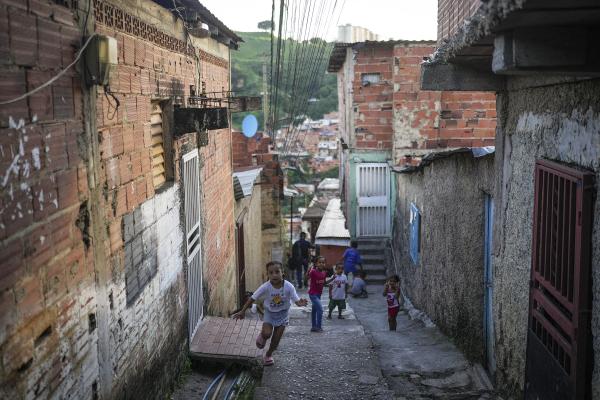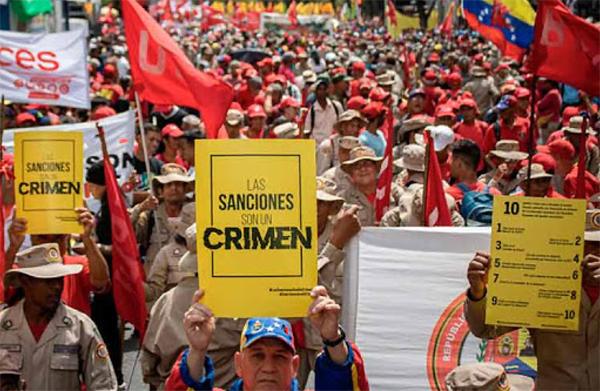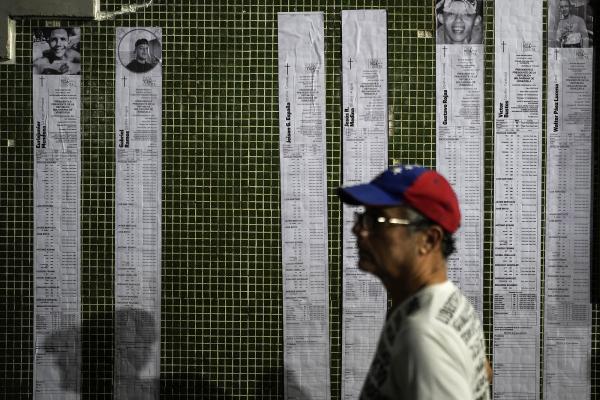Revcom.us editors’ note: This article appeared in Spanish on Alborada Comunista, website of the Revolutionary Communist Group (GCR), Colombia, and was translated into English by revcom.us volunteers. This is an important analysis of the situation in Venezuela following the presidential election held there on July 28. The election pitted the current president Nicholas Maduro, who has clashed with the U.S., against Edmundo González, a right-wing candidate backed by the U.S. Both sides claim they won the election, but Maduro has remained in power, and tensions between his regime and the U.S., which has been intervening in Venezuela for well over 100 years, have increased. Venezuela’s election has been a focus of U.S. media coverage since the election.
The GCR’s analysis cuts through the lies and distortions by the different forces involved to reveal what’s happening, why it’s happening, and where the people’s interests lie. We encourage people to read it in full. These are some of its key points:
- “Venezuela is experiencing a new crisis after the presidential elections on July 28. … [T]his electoral process was seen as an opportunity for the right-wing opposition and for the United States to put an end to the Maduro regime….”
- “The situation that the masses are experiencing in Venezuela is unbearable. It is estimated that about half of the population is in poverty, about 6.5 million Venezuelans suffer from hunger and at least 7.7 million people (a quarter of the population) have left Venezuela and have been displaced....”
- “The majority of those who claim to denounce the precarious situation of the Venezuelan people fail to identify, deliberately or out of ignorance, who is most responsible: U.S. imperialism.”
- “Contrary to what the right denounces and the Chavistas and their ‘left’ counterparts declare, Venezuela is not and has never been an authentic socialist state.”
- “In Venezuela, just like in the entire world, a world which is dominated from top to bottom by the same capitalist-imperialist system, a real revolution is needed and the most advanced theory is needed to guide it.”
Venezuela is experiencing a new crisis after the presidential elections on July 28. The elections, called after pressure from the United States (in the Doha and Barbados agreements) in exchange for the relaxation of the devastating sanctions it had imposed almost a decade ago, had as main candidates the current president Nicolás Maduro and the pro-U.S. Edmundo González.
Similar to the “self-proclamation” by Juan Guaidó as “interim president” in 2019, this electoral process was seen as an opportunity for the right-wing opposition and for the United States to put an end to the Maduro regime through electoral means after its failures in the various coups d’état which they have hatched. On this occasion, the right is more cohered around María Corina Machado, and given her disqualification as a candidate, they chose to promote González as a proxy or “calanchín” [shill].
Several hours after the polls closed, the National Electoral Committee (CNE), without making the electoral records available, proclaimed Maduro’s victory. Likewise, Machado’s followers have alleged that their candidate was the winner, saying they have a copy of the vast majority of the records which confirmed this. At the time of this writing, the CNE had not posted such records, claiming to have been “hacked.”
It is not clear who really won, which fueled a barrage of protests that have been harshly repressed in the streets and in raids (with “Operation Tun Tun”). It is not possible to predict how this situation will continue to unfold in Venezuela and the region (with the possibility of a new wave of migrations), but it is necessary to clarify some basic points about the context of the current situation:
About the Economic Situation of Venezuela
- The situation that the masses are experiencing in Venezuela is unbearable. It is estimated that about half of the population is in poverty,1 about 6.5 million Venezuelans suffer from hunger2 and at least 7.7 million people (a quarter of the population) have left Venezuela and have been displaced, mainly to Colombia, the United States, Chile, Peru, and Spain.

The situation for the masses in Venezuela is unbearable. It is estimated that about half of the population is in poverty. Here, children play in back alley of Caracas, August 2024. Photo: AP
- The majority of those who claim to denounce the precarious situation of the Venezuelan people fail to identify, deliberately or out of ignorance, who is most responsible: U.S. imperialism. The deplorable conditions in which the Venezuelan people live are in large part the responsibility of the almost total dependence on Venezuela’s oil revenues, a dependence which the Chávez and Maduro regimes intensified instead of transforming it, and to a great extent due to the economic sanctions imposed by the U.S. imperialists.
- U.S. economic sanctions began in 2017 under the Trump administration. The United States restricted operations, transactions and negotiations with the Venezuelan government, and in 2019 intensified these sanctions in order to hinder the marketing of Venezuelan oil on the international market.
- The U.S. imperialists have used economic sanctions as a cruel weapon (collective punishment) to suffocate entire countries and have presented them as if they were gentler and kinder alternatives to open war. But in fact, the sanctions that the United States has imposed on countries such as Afghanistan, Cuba, Iran, and Venezuela have pushed millions of people into hunger, malnutrition and death from curable diseases due to lack of access to medicines.

At a protest in 2021, protesters hold up signs that say, "The sanctions are a crime." Photo: venezuelaanalysis.com
- The fact that an economy like Venezuela’s depends almost entirely on oil revenues makes it extremely vulnerable both to fluctuations in the international price of crude oil and to imperialist sanctions that block or hinder the marketing of oil.
- For a century, Venezuela has based its economy almost entirely on oil production, and the regimes of Chávez and Maduro did not make the slightest change in this regard. In fact, Chávez’s “Bolivarian revolution” was based on a model of greater state control over oil revenues, and from this revenue, increasing (at least initially) investments in social programs, subsidies and social assistance.
- Chávez also intended to “sow oil”: To use oil income to fuel industry, agriculture and tourism and build a diversified economy. Chávez himself recognized that his project was framed in the capitalist system, but under an “alternative economy to dehumanized capitalism.”3
- Oil and the oil economy flow in the context of capitalist-imperialist relations, and although Venezuela has attempted to use oil as “a geopolitical weapon,” in a world dominated by capitalism-imperialism like the current one, the imperialist powers (the “Western” powers as well as Russia and China) have the upper hand to use oil as a weapon, even against a producing country like Venezuela, with the largest proven reserves in the world.
- Contrary to what the right denounces and the Chavistas and their “left” counterparts declare, Venezuela is not and has never been an authentic socialist state. In fact, in several Latin American countries, some sections of the ruling classes have adopted the “socialist” label to carry out programs of resistance to certain elements of U.S. imperialism, in order to secure a better deal with the imperialist system as a whole. They combine this with social welfare programs popular with the masses and describe this as “socialism” (or “21st century socialism”), but this has nothing in common with authentic revolutionary socialism which aims to break free from imperialist relations as part of fighting for a socialist world FREE from such oppression.
- In Venezuela, Chavismo has paid for its social assistance programs with the profits from the sale of the country’s oil on the world capitalist market, as long as it has been able to do so. And with these profits they also fostered the loyalty of the armed forces to their regime. This arrangement has kept Venezuela firmly anchored in the framework of the global capitalist system, although not under direct U.S. domination, and subordinated to its anarchic functioning, its economic blackmail and the wars of imperialist powers.
- Venezuela’s economic relations, its production relations, do not break at all with capitalist relations characterized by socialized production and private appropriation, putting profits in command. These production relations are, fundamentally, what determine the dynamics and organization of a given society. And the state plays the role of protecting and expanding those relations and imposing the interests of the social group—the ruling class—that occupies the dominant position in society, as a result of its role in the economy and in particular its ownership and control of the main means of production.
- With the regimes of Chávez and Maduro, a section of the big bourgeoisie emerged which some have called the “boliburguesía” [Bolivarian bourgeoisie], which has amassed large profits thanks to products and services linked to state activity, oil revenues and imports. At the same time, other “traditional” sections of the big bourgeoisie have remained, which, although some have been beaten down such as with expropriations and price controls, have not completely lost their position, and in recent years they seem increasingly willing to be “pragmatic” and to “dance a bit” with the regime.
- Under Chávez there was a wave of nationalization and expropriations of sections of industry, agriculture and commerce. But the fact that, in a country like Venezuela, or Cuba, the ownership of the means of production, or at least most of them, is in the hands of the state, does not change its capitalist nature as long as its economic relations are based on and are sustained by the capitalist principles of putting “profit in command,” and under the logic of “expand or die.” And this is especially evident in Venezuela’s relationship with oil, a commodity that has played a special role within the global system of capitalism-imperialism.
- Hugo Chávez’s “Bolivarian revolution” project largely emerged as a response to the neoliberal wave of the late 1980s (Reagan, Thatcher, Deng, Pinochet), which brought with it impoverishment and deepening capitalist exploitation (which in Venezuela led to mass uprisings such as the “Caracazo” of 1989), and was coupled with the counterrevolutionary ideological offensive after the restoration of capitalism in China and the collapse of the Soviet social-imperialist bloc (around 1990), which produced a false verdict that the experiences of socialism (which did happen in Russia from 1917 to 1956 and in China from 1949 to 1976) were a nightmare.
- But the “Bolivarian revolution,” which marked the beginning of what was called the “pink wave” in Latin America, did NOT ever have any tinge of socialism. Despite the improvements for some time in the situation of sections of the people, this regime is not socialist nor does it represent a model for liberation; it represents the model of society that defends the interests of certain bourgeois nationalist forces who do not seek to break their dependence on imperialism, but to strengthen the position of a nation like Venezuela within the framework of the global capitalist-imperialist system.
About the Illusions in the Elections
- While some governments stated that the posting of the electoral records was essential to determine the winner of the elections, other governments such as in Russia, China, Iran, Cuba, and Nicaragua rushed to recognize Maduro as the winner of the elections, and at the same time, other governments such as the United States and Argentina declared González the winner.
- The opacity of the Venezuelan regime in refusing to make public the electoral records and its maneuvers to keep Maduro in power are very similar to the attempts of reactionary fascist forces such as Bolsonaro in Brazil and Trump in the United States who refused to recognize their electoral defeat and did everything in their power to try to stay in power.
- The “defense of democracy” and “democratic elections” is hypocritical, shameless and criminal. There is no country which has orchestrated, supported and executed more coups against “democratically” elected rulers than the United States.4 It suffices to remember the coup d’état in Honduras in 2009 against Manuel Zelaya and the almost immediate recognition of the new coup government by the United States and other countries such as Colombia, Peru and Costa Rica.
- At the same time, when electoral victories like Chávez’s in 2000 or 2006 were indisputable, did the United States rush to defend the fact that, despite not liking this government, the “democratic” decision of the voters had to be respected? No. In fact, the United States was involved in the coup against Chávez in 20025 and in numerous subsequent attempts to oust the Chávez and Maduro regimes. The United States is not about “defending democracy” and “opposing dictatorship,” but rather it is about taking advantage of the opportunity to impose a regime that is more loyal to its interests, especially amid the challenge to its imperialist hegemony by China and Russia, which are imperialist powers to which the Maduro regime has become increasingly closer in recent years, as it has also done with the reactionary Iranian regime.
- The use of the state apparatus to viciously repress those who oppose it, with mass and arbitrary imprisonment, etc., has led some to describe the Chavista regime as an authoritarian regime or as a “dictatorship.” And it is.

Venezuelan presidential election tallies, or "actas," with the faces of prisoners detained, August 8, 2024. Photo: AP
- “Regardless of differences, even very great and qualitative differences, in their political structures, institutions and guiding principles, all states have a definite social content and class character: they are an expression of the prevailing social relations, and most fundamentally the economic relations (relations of production), which have a decisive and ultimately determining role in regard to how the particular society functions and is organized. The state serves to protect and expand those relations and to enforce the interests of the social group—the ruling class—which holds the dominant position in society, as a result of its role in the economy, and in particular its ownership and control of the major means of production (including land, raw materials and other resources, technology and physical structures such as factories, and so on).”
- “In capitalist society, it is the capitalist class which holds this dominant position: the government structures and processes—and above all the organs of the state as an instrument of class rule and suppression (the armed forces, police, courts and prisons, the executive power, and the bureaucracies)—are controlled by this capitalist class as a means of exercising its rule over society and its repression of forces whose interests are in significant opposition to, and/or which resist, its rule. In short, all states are an instrument of dictatorship—of a monopoly of political power, concentrated as a monopoly of ‘legitimate’ armed force and violence—exercised by, and in the interests of, one class or another. Any democracy which is practiced in this situation is democracy on the terms of, and fundamentally serving the interests of, the ruling class and its exercise of dictatorship.”6
- The Colombian right is using the crisis in Venezuela to promote its reactionary program and manipulates with the “bogeyman” that “Colombia is going to become like Venezuela” if a “left-wing government” is allowed to win again. “Fico” Gutiérrez, the mayor of Medellín, and Andrés Julián Rendón, the governor of Antioquia, called for rallies to “condemn the dictatorship” [in Venezuela] and express support for Edmundo González and María Corina Machado. And it is ironic that the right, like many sections of the “left,” do not cease their song and dance against support for the just struggles of the people of the world, and question the concern for “outside things,” but demand that people concern themselves when “the outside things” are in line with their reactionary interests.
Yes, Venezuela requires a radical transformation, but not to go back, with the traditional ruling classes recycling the Puntofijismo7 of the Adecos and the Copeianos, hand in hand with the the U.S. imperialists, which, as Bob Avakian rightly points out (in BAsics 1:3): What they bring to the world “is not democracy, but imperialism and political structures to enforce that imperialism.”
In Venezuela, just like in the entire world, a world which is dominated from top to bottom by the same capitalist-imperialist system, a real revolution is needed and the most advanced theory is needed to guide it. The interests of the vast majority of the people corresponds to opposing with everything the great evils of the imperialist capitalist system and taking a position with the large masses of humanity, as part of creating a movement for revolution, in order to overthrow this system and embark on the path to overcome all relations of exploitation and oppression, and all destructive antagonisms between people, throughout the world.
@ComRevCo | August 2024